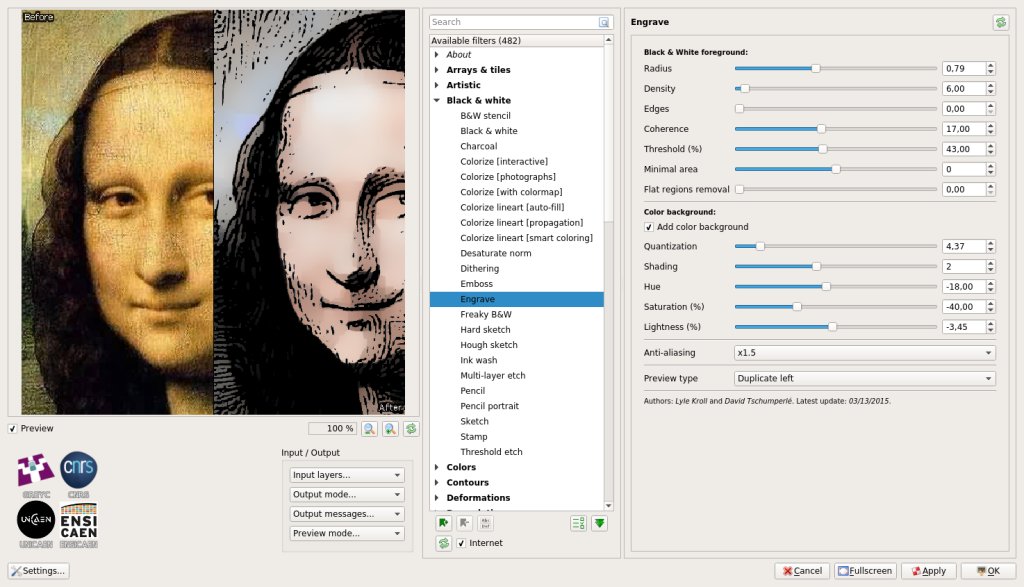Install the Plug-in from the G’MIC Website. You’ll of course need to start by downloading the actual. Steps for Shooting Landscapes for Focus Stacking. Place the camera on a sturdy tripod; this is a must!; Frame the subject and compose the shot.; Determine exposure for the scene and set the camera to manual mode to ensure that the exposure is constant for every image.; Set the camera to Live View and aim the focus point at the nearest object you want in focus.
G'MIC is a full-featured open-source framework for digital image processing, distributed under the CeCILL free software licenses (LGPL-like and/or GPL-compatible). It provides several user interfaces to convert / process / visualize generic image datasets, ranging from 1D scalar signals to 3D+t sequences of multi-spectral volumetric images, hence including 2D color images.
We provide these different G'MIC user interfaces:
1 - gmic, a command-line tool to use the G'MIC image processing features from a shell. In this setting, G'MIC may be seen as a friendly companion to the ImageMagick or GraphicsMagick software suites. | |
2 - G'MIC-Qt, a plug-in to bring G'MIC capabilities to the image retouching and painting software GIMP, Krita, Photoshop, Affinity Photo, PaintShop Pro, PhotoLine and Paint.NET. More than 500 filters are already available, sorted by category (Artistic, Black & white, Colors, Contours, Deformations, Degradations, Details, Color Grading, Frames, Layers, Light & shadows, Patterns, Rendering, Repair, Sequences, etc.). | |
3 - libgmic, a small, portable, thread-safe and multi-threaded, C++ image processing library to be linked to third-party applications. Its simple API allows programmers to add all G'MIC features in their own software without much efforts (a C API is available as well). | libgmic, a small, thread-safe, multi-threaded, C++ image processing library to embed all G'MIC features in third-party applications. |
4 - G'MIC Online, a web service to allow users applying image processing algorithms on their images, directly from a web browser. | G'MIC Online, the web service to use G'MIC from a browser. |
5 - ZArtScreenshot of ZArt in action., a Qt-based interface for real-time processing of video streaming coming from webcams or video files. | ZArt, a real-time video processing software using the G'MIC processing library. |
Other open-source projects are known to use some of the G'MIC features:

- EKD, a free software dedicated to postproduction processing for videos and images.
- Flowblade, a multitrack non-linear video editor for Linux released under GPL 3 license.
- Photoflow, a fully non-destructive photo retouching program.
- Veejay, a visual instrument and realtime video sampler.
The G'MIC source code has been registered to the APP (French Agency for the Protection of Programs) by the CNRS, under registration number:
IDDN.FR.001.170024.000.S.P.2017.000.21000.
The source code of G'MIC is shared between several git repositories with public access. Accessing it via git ensures you get the latest code available, and will ease the source updates as well. Here are the instructions to compile G'MIC on a fresh installation of Debian (or Ubuntu). It should not be much harder for other distros. First you need to install all the required tools and libraries:
Then, get the G'MIC source from the different repositories:
$ git clone --depth=1 https://github.com/dtschump/CImg.git
$ git clone --depth=1 https://github.com/dtschump/gmic.git
$ git clone --depth=1 https://github.com/c-koi/gmic-qt.git
$ git clone --depth=1 https://github.com/c-koi/zart.git
You are now ready to compile all G'MIC interfaces:
- gmic (command-line tool),
- gmic_gimp_qt (plug-in for GIMP),
- gmic_krita_qt (plug-in for Krita),
- ZArt and
- libgmic (G'MIC C++ library).
Just pick your choice:
$ cd gmic/src
$ make cli # Compile command-line interface
$ make gimp # Compile plug-in for GIMP
$ make krita # Compile plug-in for Krita
$ make lib # Compile G'MIC library files
$ make zart # Compile ZArt
$ make all # Compile all of the G'MIC interfaces
Gmic For Affinity Photo
and go out for a long drink (the compilation takes time).

Gmic Affinity Photo
Note that compiling issues (compiler segfault) may happen with older versions of g++ (4.8.1 and 4.8.2). If you encounter this kind of errors, you probably have to disable the support of OpenMP in G'MIC to make it work, by compiling it with:
Also, please remember that the source code in the git repository is constantly under development and may be a bit unstable, so do not hesitate to report bugs if you encounter any.


Comments are closed.